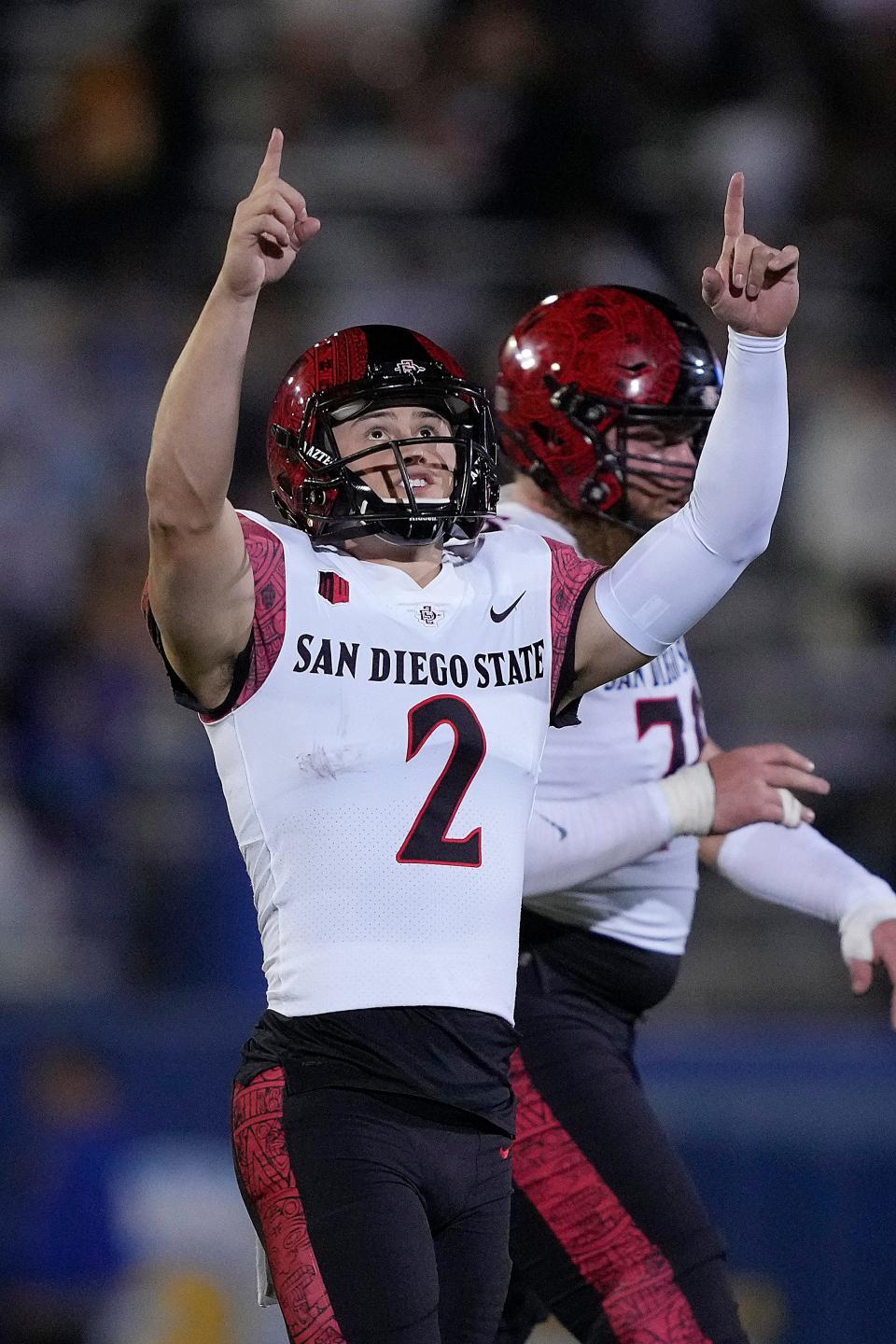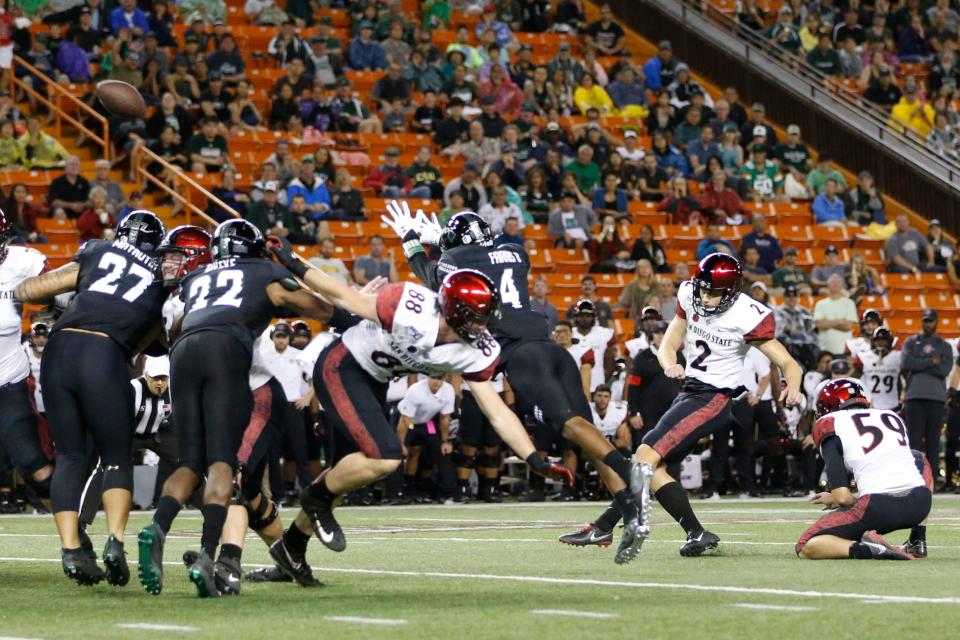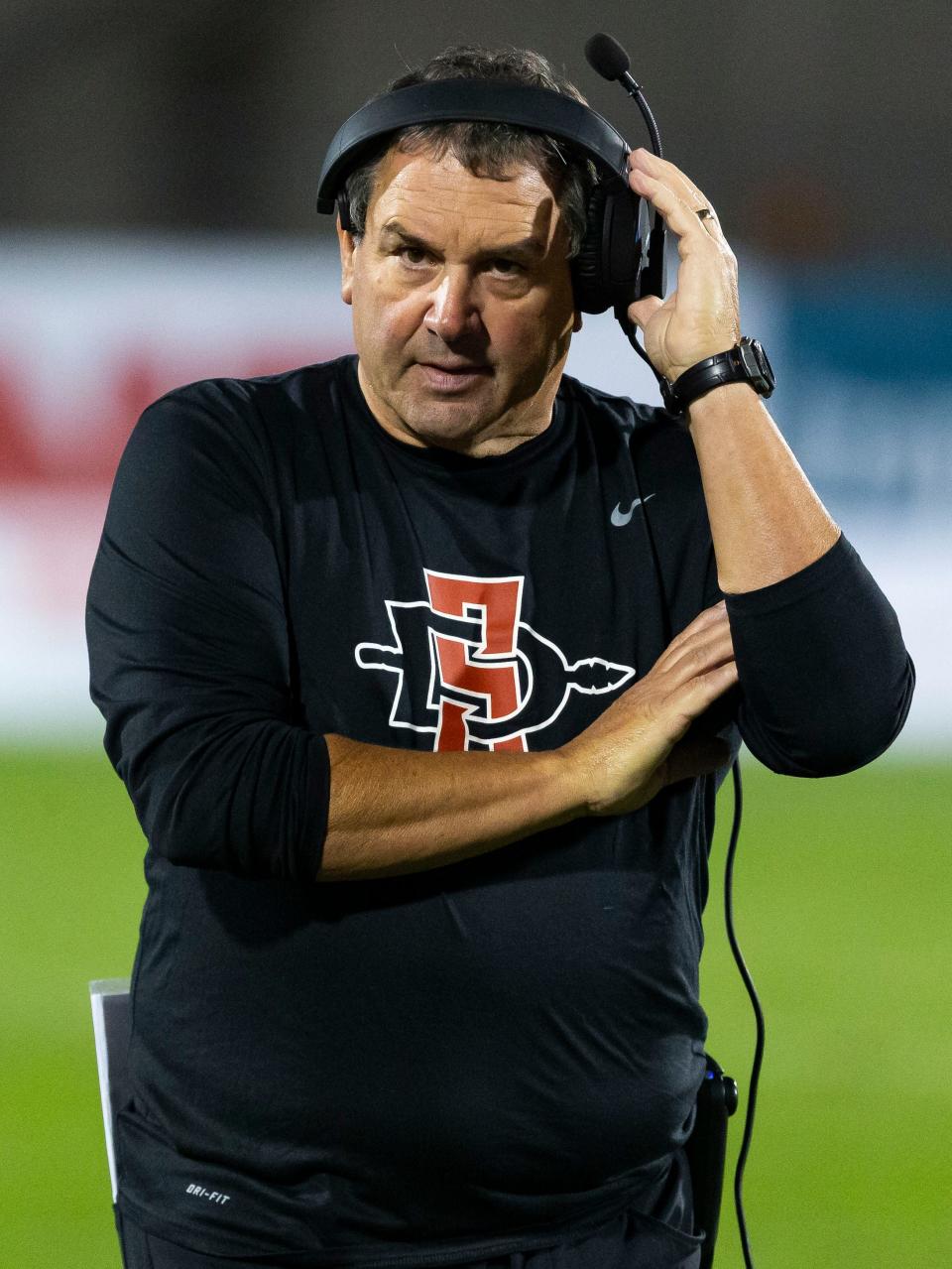Why didn't SDSU do more amid rape allegations against Matt Araiza, others?
SAN DIEGO — A search for Matt Araiza ended about 20 miles north of this city.
One afternoon this week, he opened the front door of his family's home in Poway. His mother quickly slammed it shut after shouting at a reporter, "We're getting death threats! Leave us alone!''
Less than a week after the Buffalo Bills released Araiza amid rape allegations stemming from a police report filed in October, it's unlikely he will find refuge at the school he once called home. Last season he was a consensus All-American at San Diego State University (SDSU), where he played three seasons before declaring for the NFL draft.
On Thursday, SDSU provided USA TODAY Sports with an update on its relationship with the player nicknamed "Punt God.''
“Matt Araiza is not connected with the university or the football team," the school said.
It should be a celebratory time for the Aztecs, with the team set to play in a shiny new venue — Snapdragon Stadium, a 35,000 seat facility built at an estimated $310 million — to kick off the football program's 100th season.
Instead, the school is defending its integrity and decision making. Criticism has mounted after what transpired when a 17-year-old girl reported to the San Diego Police Department (SDPD) that Araiza and two other SDSU football players gang-raped her at an off-campus house party that began Oct. 16 and spilled over into the next day.
The woman, a high school senior at the time and now 18, went to police Oct. 18 and reported the alleged assault she said left her bloodied and bruised, according to a civil lawsuit her attorney filed last week in San Diego County Superior Court.
The school said it was notified Oct. 19 of the incident and that SDPD had opened an investigation but did not publicly acknowledge either until June 3 - nearly eight months later.
"I remember exactly when I got the phone call from one of our vice presidents," John David Wicker, in his sixth season as athletics director at SDSU, told USA TODAY Sports this week. “... Obviously, what’s alleged to have happened is horrible. It’s not obviously something we’re going to stand for in our program or this institution. And we continue to work to be better in that area.''
Reading from a prepared statement on Monday, SDSU football coach Brady Hoke said in part, "What was reported to have happened should have never happened. Ever.’’
No words have been enough to end the scrutiny of the university's actions.
'Looking the other way'

The school said that on Oct. 19 SDPD requested that campus police "stand down and not take action which would compromise the integrity of SDPD’s criminal investigation."
SDPD put that request in writing Oct. 28, according to the school, which several months later said, "After careful consideration, SDSU determined that cooperating with the criminal investigation was the appropriate action to help ensure the highest likelihood of real consequences for anyone found responsible.''
With the school deferring to the SDPD, Araiza and the two other football players named as defendants in the lawsuit remained on the team during a 12-2 season that culminated with a 38-24 victory over Texas at San Antonio in the Frisco Bowl.
Dan Gilleon, an attorney for the woman, said SDSU is among the enablers "looking the other way in denial that my client deserves justice even if the defendants are prized athletes.''
Wicker, the athletics director, has rejected such accusations.
“Anybody that alleges that it was some kind of cover-up or something like that because we were having a successful football season is absolutely incorrect,’’ he said while sitting in his office at SDSU’s Fowler Athletic Center. "That calls into question my morals and my ethics, the morals and ethics of our football coach, the morals and ethics of our institution. That is absolutely not the case.’’
But at the school of 34,000 students, frustration also stems from indisputable facts.
'Duty to act under Title IX'
SDSU issued a written statement from university president Adela de la Torre on June 3, the same day a Los Angeles Times investigative report brought to public light the allegations.
The statement from de la Torre did not directly address the school's delay in publicly acknowledging the reported sexual assault. But it did say the SDPD "formally requested that the university not initiate a separate investigation or take other actions – including conducting interviews – which could and would compromise its criminal investigation.''
Grace Hite, a junior at SDSU, expressed disappointment with the school.
“I think that there should have been full disclosure right when it happened or whenever they found out about it,’’ Hite, 21, said while sitting outside the student union earlier this week.
Hite, a sociology major, said she used to follow the football team on social media as a matter of school pride. But not anymore.
“I don’t want to get close to any group that might be protecting or associated with an abuser,’’ Hite told USA TODAY Sports. “So I unfollowed them.’’
Seated nearby, a senior who spoke on the condition she not be identified by name because her part-time job involves the university, told USA TODAY Sports, “I think they should have informed all the students right away. Because it’s not just informing us, it’s also making sure that we’re safe.’’
By complying with the police department's request not to investigate, SDSU officials ruled out interviewing football players or taking disciplinary action against any players before receiving approval from the SDPD to initiate its own investigation. That took more than nine months.

Laura Dunn, a lawyer based in Washington D.C. who works with victims of sexual violence on college campuses, told USA TODAY Sports, "I can't imagine there being a justifiable reason for the law enforcement investigation to take nine months.''
The SDPD has not addressed such criticism directly. But a news release issued on Aug. 4 announced the investigation was complete and that it included the following: executing 10 search warrants, interviewing "multiple people,'' reviewing more than three terabytes of digital evidence and employing a team of more than 20 investigative personnel who logged 200 hours of overtime.
"Since the initial radio call, SDPD has made this criminal investigation a priority,'' the news release stated.
The case has been submitted to the San Diego District Attorney’s office and is under review, according to Tanya Sierra, public affairs officer for the District Attorney’s Office.
“There is no timeline for how long it will take,’’ Sierra said of the review last week, and on Thursday, she said there was no update.
Gilleon, attorney for the woman who filed the sexual assault report, called the investigation "sloppy'' and said the police failed to request his client's journal.
Much of the debate over SDSU's decision to delay conducting its own investigation revolves around Title IX, the landmark law that banned sex-based discrimination in schools. Title IX covers cases of sexual assault and, when triggered, can obligate a school to investigate.
But SDSU says the reported sexual assault is not such a case.
"Title IX does not apply to off-campus locations over which the university has no control; that is San Diego Police Department’s jurisdiction,'' said La Monica Everett-Hayes, the school's associate vice president and chief communications officer, via email.
So now, SDSU says, school officials are looking to identify any violations beyond the confines of Title IX, such discrimination, harassment, sexual misconduct and violence covered in the California State University student conduct policy..
Courtney Bullard, an attorney based in Chattanooga, Tennessee, whose practice includes a focus on Title IX, said SDSU's stance that Title IX did not apply made it easier for the school to justify waiting for the police to complete its investigation.
“The Office for Civil Rights, which enforces Title IX, is looking at how an institution responds,'' Bullard said. "Federal guidelines are more prescriptive typically than other campus processes.
"They'll just have a lot more flexibility.''
But Dunn, the attorney whose work with victims of sexual violence involves the application of Title IX, said SDSU erred.
She said she agreed the school "had no duty to implement the Title IX grievance process to adjudicate the off-campus sexual assault.'' But Dunn also referred to anonymous tips the school received about the reported sexual assault.
The Los Angeles Times on June 3 brought the issue to public light. Its investigative report cited multiple anonymous messages sent to the school from concerned SDSU athletes just days after the reported sexual assault. None of those people providing tips had attended the party, according to the newspaper.
Now, SDSU says that on Oct. 27, with the school assisting the police, "SDSU responded to the individuals sharing anonymous information, requesting that the individuals contact the Title IX Coordinator so that the Title IX Coordinator could learn more about the incident."
The anonymous reporters declined the request, according to the school, which said none of the people were able to provided first-hand witness accounts.
"Given how many anonymous tips came into the school about the incident,'' Dunn said via email, "it had actual notice of a hostile environment arising on campus from this off-campus incident where a student victimized a non-student, and thus had a duty to act under Title IX.''
Football players heard no later than November that Araiza was linked to the reported sexual assault, according to a player on last year’s team who spoke to USA TODAY Sports on condition he not be identified by name because of the sensitivity of the situation.
Faced with questions about why the school did not take action on the anonymous tips, SDSU officials have repeatedly noted that no arrests have been made and no charges have been filed against any suspects.
On July 22, the school says, it got approval from SDPD to initiate its own investigation and has done so.. By then, among other things, Araiza had helped the team to its first 12-win season in school history; won the Ray Guy Award, given annually to the nation's top collegiate punter; and graduated, which means he will not be obligated to cooperate with any school investigation, according to Wicker, SDSU's athletics director.

Araiza has denied the allegations in statements issued by his attorney, Kerry Armstrong. Lawyers for the two other players have not returned phone messages from USA TODAY Sports seeking comment.
The two other former players named as defendants – Zavier Leonard, an offensive lineman, and Nowlin "Pa'a" Ewaliko, a defensive lineman – "are not currently involved with the football team or any athletic activities,'' according to SDSU. The school would not confirm whether the former players were still enrolled at SDSU.
SDPD announced on Aug. 4 it had completed the investigation. It has been submitted to the San Diego District Attorney’s office and is under review, according to Tanya Sierra, public affairs officer for the District Attorney’s Office.
“There is no timeline for how long it will take,’’ Sierra said of the review last week, and on Thursday, she said there was no update.
Rumors swirled around Araiza in fall
The Bills, who selected Araiza in the sixth round of the June draft, announced on the same day the lawsuit was filed they would keep their talented rookie.
“We were recently made aware of a civil complaint involving Matt from October 2021,” the Bills said in a statement released Aug. 25. “Due to the serious nature of the complaint, we conducted a thorough examination of this matter. As this is an ongoing civil case, we will have no other comment at this point.”

At the same time, evidence and allegations contained in the lawsuit were spreading online. Photos showed bruises on the woman's neck and legs that she said she suffered during the alleged rape.
Screenshots of text messages showed detectives coaching the woman during recorded phone calls on which Araiza, then 21, allegedly acknowledged having sex with the woman, then a minor.
Portions of the lawsuit, in which the woman is referred to as Jane Doe, underscored the alleged violence. One excerpt read: "Doe was raped for about an hour and a half until the party was shut down. Doe stumbled out of the room, bloody and crying. Her nose, belly button and ear piercings had been pulled out, and she was also bleeding from her vagina.''
USA TODAY does not identify victims of sexual assault.
Two days after the Bills announced they were keeping Araiza, the team released him.
The Bills have indicated they knew nothing about the rape allegations before the draft. But rumors started swirling long before that, according to a player on last year’s team who spoke on condition he not be identified by name because of the sensitivity of the situation.
The player said that on Nov. 28 he heard Araiza's name and that freshmen players in connection with the reported sexual assault. That discovery took place the day Brenda Tracy, a rape survivor who speaks at colleges to raise awareness about sexual violence, met with the football team.
“It was kind of done really abruptly, and they said, mandatory meeting,’’ the player told USA TODAY Sports of Tracy’s visit. “It was like while we were waiting to go there that I actually heard the reasoning from another teammate, the reason we were having this talk.’’
Wicker, the athletics director, acknowledged there were rumors about which players were involved in the alleged rape. “When it’s second- and third-hand knowledge, what can you really do with that?’’ he said.
Wicker had reached out to Tracy, who in 1998 was gang-raped by two Oregon State football players and two other men. She agreed to speak to the football team.
Three days after the allegations in the civil lawsuit became public, Tracy issued a two-page statement on Twitter in which she said she was unaware football players had been under investigation by police when she was invited to campus.
“Was I being manipulated? I don’t know,’’ Tracy wrote on Twitter. “Was I there for PR purposes? I don’t know.’’
As football practice got underway Wednesday, Alex Lugo, a senior at SDSU, stopped to take a picture with her phone. She said she plans to go to the team's game Saturday but knows others won't because of the rape allegations.
"A lot of people are like, ‘We don’t want to support that,' " Lugo said. "It's a big deal.''
This article originally appeared on USA TODAY: Matt Araiza rape allegations weren't investigated by SDSU. Why?

